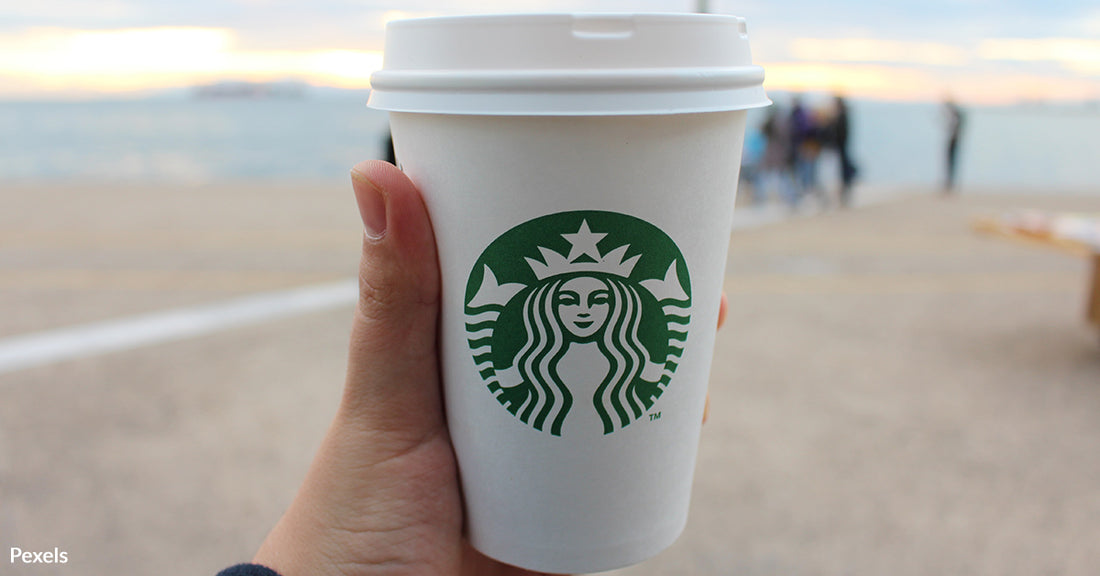Starbucks Aims to Expand Reusable Cup Initiative to Drive-Thru and Mobile Orders, Reducing Waste
Matthew Russell
Pexels
Starbucks' coffee cups have a pressing climate problem as the company experiences a surge in mobile and drive-thru orders, CNBC reports. To address this issue, the company aims to allow customers to use reusable cups for all types of orders, including drive-thru and mobile, at all its U.S. locations, according to Elite Daily. This represents a significant shift for a company that relies heavily on mobile and drive-thru sales, with 74% of its sales coming from these channels.
 Photo: Pexels
Photo: PexelsHelp us support alternatives to single-use cups.
The Reusable Cup Initiative
Since 1985, Starbucks has offered customers the option to bring their own reusable cups to store counters, even providing a 10-cent discount as an incentive. However, this initiative's extension to drive-thru and mobile orders is a game-changer. Currently, Starbucks estimates that it uses a staggering 6 billion disposable cups annually, comprising about 40% of its packaging waste, including lids, Greenpeace reports.
 Photo: Pexels
Photo: PexelsManufacturing disposable cups and straws contributes to air and water pollution.
The Success Factors and Challenges
Starbucks' recent success is evident in its increase in stock value over the past years. According to QSR Magazine, the company reports serving more customers during peak hours than before the pandemic. But the key factors driving the reusable cup initiative are the rising demand for cold drinks, customized orders, and the loyalty program. Cold beverages, often served in plastic cups, now surpass hot drinks in terms of orders, Business Insider reports. Additionally, a significant portion of sales comes from customized drinks and loyalty program members.
The shift towards mobile and drive-thru ordering was prompted by long wait times in stores, which resulted in lost sales for the company. However, implementing the reusable cup program in these channels poses new challenges. As Mashed reports, at drive-thrus, customers may experience added wait times as they hand over their reusable cups, while mobile orders may no longer be immediately available for pickup if customers choose to bring their own cups. Achieving the goal of reusable cups across all ordering methods could reshape the on-the-go coffee experience.
 Photo: Pexels
Photo: PexelsConsumer awareness and behavior change play a crucial role in reducing pollution from disposable cups and straws.
Speed and efficiency are crucial to Starbucks' management. As part of its reinvention plan, the company introduced the "Siren system" to streamline the production of complex drinks, reducing employee movements and enabling machines to create drinks without accessing ingredients from multiple stations, CNN reports.
Before the nationwide rollout, Starbucks is conducting a final test of the all-reusable option in Colorado, KDVR reports. The test includes drive-thru orders but excludes mobile orders. Thus far, Starbucks reports no disruptions to the customer experience during the testing period.
Starbucks has been experimenting with reusable cup concepts worldwide. In Singapore, they launched the "Borrow A Cup" program, allowing customers to borrow cups from Starbucks stores, incentivizing their return with a refundable deposit. Similar programs have been adopted in South Korea, Tokyo, and cities across Europe. However, in the U.S., the focus remains on encouraging customers to bring their own reusable cups, with limited implementation of borrowing programs.
 Photo: Pexels
Photo: PexelsTransitioning to sustainable alternatives for coffee cups and straws is essential for a cleaner and healthier planet.
Sustainability Goals and Challenges
While progress has been made, Starbucks' history of unfulfilled sustainability goals raises concerns. Previous targets, such as having 25% of beverages served in reusable cups by 2015, fell drastically short, The Verge reports. The company's past failures to meet deadlines and develop recyclable cups raise skepticism among sustainability watchdogs. However, the success of the reusable cup initiative ultimately depends on consumer behavior. Research suggests that implementing charges for disposable cups is more effective than offering discounts for reusable cups, as people are more motivated by the fear of loss.
Promoting Awareness and Education
Starbucks acknowledges that there is a lack of awareness among consumers and employees about the availability and benefits of reusable cups. Advertising and educating customers about the program are vital steps in encouraging wider adoption. Starbucks has already placed signage in stores and sent emails to Rewards members to inform them about the initiative. The company aims to replace the symbol of waste—the disposable cup—with a reusable alternative, setting an example for the entire industry.
 Photo: Pexels
Photo: PexelsSingle-use cups and straws are a significant source of litter on beaches, streets, and parks.
The Future of Sustainability at Starbucks
The future of Starbucks' cups has far-reaching implications, as smaller cafes look to larger corporations like Starbucks to lead the way in
driving sustainable practices in the coffee industry. Starbucks' iconic cups are recognized worldwide, and if they can successfully replace disposable cups with reusable ones, it could spark a significant shift in people's mindsets and inspire other coffee shops to follow suit.
Environmental advocates emphasize the importance of Starbucks' initiative, as smaller cafes often look to industry leaders to set the precedent for sustainable operations, Why Whisper reports.
 Photo: Pexels
Photo: PexelsThe production of disposable cups and straws contributes to deforestation and greenhouse gas emissions.
Individual Actions Make A Difference
Encouraging customers to bring their own reusable cups remains a key focus for Starbucks. Although borrowing programs like the one tested in Seattle and implemented overseas have shown promise, a broader advertising campaign and education initiatives are necessary to ensure customers are aware of the availability and benefits of reusable cups. By making reuse the norm, Starbucks can drive meaningful change and make sustainable practices the default way of serving coffee.
Starbucks' commitment to allowing reusable cups for all types of orders, including drive-thru and mobile, represents a significant step towards tackling plastic pollution and reducing waste. By actively involving customers and transforming their iconic cups into symbols of sustainability, Starbucks can lead the industry towards a more environmentally conscious future.
 Photo: Pexels
Photo: PexelsSome coffee chains and establishments have started implementing reusable cup programs to reduce waste.
To support Starbucks in its efforts and make a positive impact on the environment, here are five actions you can take as an individual:
- Bring your own reusable cup: Make it a habit to bring your own reusable cup whenever you visit a coffee shop, including Starbucks. By doing so, you eliminate the need for a disposable cup and contribute to reducing waste.
- Spread the word: Share information about Starbucks' reusable cup program and the importance of sustainable choices with your friends, family, and colleagues. Encourage them to join the movement and make a difference.
- Opt for dine-in or sit-down service: When possible, choose to enjoy your coffee inside the café or take a few minutes to sit down and savor your drink. This reduces the need for takeaway cups altogether.
- Educate yourself: Stay informed about the environmental impact of plastic pollution and the benefits of reusable alternatives. Learn about the initiatives taken by coffee shops and other businesses to promote sustainability.
- Support Policy Changes: Lend your voice to advocate for policy changes that promote reusable alternatives and reduce coffee cup pollution. By supporting initiatives such as deposit systems or extended producer responsibility, we can create a more sustainable future.
By taking these actions and making conscious choices, we can all contribute to mitigating the environmental impact of plastic pollution. Let's join Starbucks in its commitment to sustainable practices and work towards a future where our coffee rituals are not marred by unnecessary waste. Sign the pledge to end plastic cup pollution. Together, we can make a significant difference and protect our planet for generations to come!
Matthew Russell is a West Michigan native and with a background in journalism, data analysis, cartography and design thinking. He likes to learn new things and solve old problems whenever possible, and enjoys bicycling, spending time with his daughters, and coffee.




















